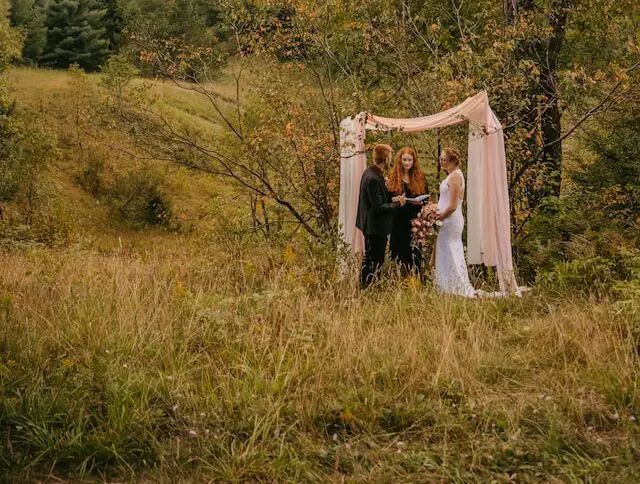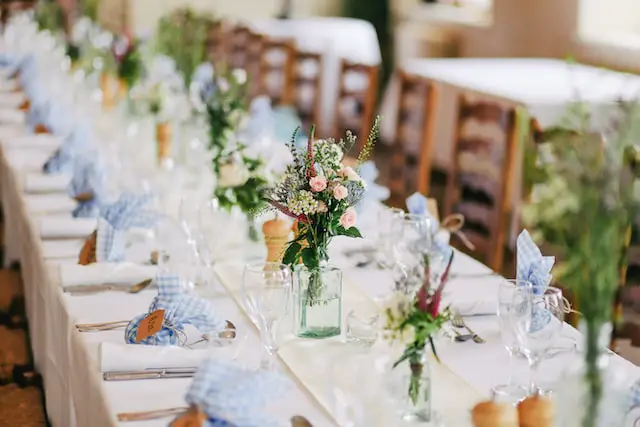The main difference is that eloping usually takes less planning than a traditional wedding and provides more freedom in terms of the location, while traditional weddings typically involve more people and require much more time for preparation.
What is eloping?
(Photo by Nicole Geri on Unsplash )

Eloping is a term typically used to describe getting married without telling anyone beforehand, or getting married in secret. While there are many different reasons why couples may choose to elope, the most common reason is to avoid the hassle and expense of a traditional wedding. Eloping can be as simple as going to the courthouse to get a marriage license and then getting married in front of a justice of the peace, or it can be more elaborate, like renting out a private villa for a week and getting married on the beach.
What is getting married?
(Photo by Photos by Lanty on Unsplash )

Getting married and eloping are both ways to formalize a committed relationship, but they differ in how the couple chooses to go about it.
Getting married is the more traditional approach, which often involves planning and inviting friends and family to the ceremony. The couple typically announces their engagement, sends out wedding invitations, and may spend months or even years planning the ceremony and reception. The wedding is often a public celebration of the couple’s love and commitment, and it may involve traditions and rituals that are important to the couple and their families.
Eloping, on the other hand, is a more private and spontaneous way to get married. The couple chooses to skip the traditional wedding planning process and may choose to get married in secret, without telling friends or family. Instead of a large ceremony and reception, the couple may opt for a small, intimate wedding, often in a unique or unconventional location.
Both getting married and eloping involve legal and social recognition of a couple’s commitment to each other. However, the main difference between the two is the level of formality and involvement of friends and family. Getting married is typically a more formal and traditional event that involves inviting loved ones to share in the celebration, while eloping is a more private and spontaneous way to tie the knot.
The differences between eloping and getting married
Eloping and getting married are both ways to formalize a committed relationship, but there are some key differences between the two:
Definition: Eloping typically refers to a secretive and spontaneous act of getting married without telling friends or family, while getting married usually involves planning and inviting friends and family to the ceremony.
Formality: Eloping is typically a less formal and less structured affair than getting married, which often involves a more traditional ceremony with specific rituals and expectations.
Legal requirements: Both eloping and getting married require the couple to meet certain legal requirements, such as obtaining a marriage license and having a registered officiant perform the ceremony. However, these requirements can vary depending on the location and type of ceremony.
Social expectations: Getting married is often viewed as a more socially acceptable way to formalize a relationship, while eloping may be seen as unconventional or even rebellious.
The main difference between eloping and getting married is the level of formality and involvement of friends and family. Eloping is typically a more private and spontaneous act, while getting married is a more formal and traditional event that involves inviting loved ones to share in the celebration.
Why do couples choose to elope?
Couples choose to elope for a variety of reasons, including:
- Intimacy: Some couples prefer a private and intimate wedding ceremony that focuses solely on their love and commitment to each other.
- Cost: Weddings can be expensive, and some couples opt to elope to save money on wedding expenses such as venue rentals, catering, and decorations.
- Stress: Planning a wedding can be stressful, and some couples may feel overwhelmed by the logistics of organizing a large ceremony and reception. Eloping can be a way to bypass the stress and focus on the love and commitment between the couple.
- Tradition: Some couples may not want a traditional wedding ceremony and may prefer to elope as a way to break from traditional expectations.
- Family dynamics: Family dynamics can be complex, and some couples may choose to elope to avoid potential conflicts or tension with their families.
- Spontaneity: For some couples, eloping can be a fun and spontaneous way to tie the knot without the pressure of planning a formal wedding.
The decision to elope is a personal one that depends on the couple’s preferences and circumstances.
Advantages and disadvantages of eloping
Advantages of eloping:
- Intimacy: Eloping provides an opportunity for a couple to have a more intimate wedding ceremony that focuses solely on their love and commitment to each other.
- Cost-effective: Weddings can be expensive, and eloping can be a more cost-effective option, allowing couples to save money on wedding expenses such as venue rentals, catering, and decorations.
- Less stress: Planning a wedding can be stressful, and eloping can be a way to bypass the stress and focus on the love and commitment between the couple.
- Flexibility: Eloping can provide a level of flexibility that is not always possible with a traditional wedding. Couples can choose to get married at any time, in any location, and in any way they want.
Disadvantages of eloping:
- Lack of family and friends: Eloping means that family and friends may not be present to witness the couple’s union, which can be a source of disappointment or regret for some couples.
- Lack of celebration: A traditional wedding usually involves a celebration with family and friends, but eloping often means missing out on that celebration.
- Tradition: For some couples, eloping may not be seen as a traditional or acceptable way to get married, which can be a source of tension or conflict with family members or society at large.
- Regret: Some couples may regret not having a traditional wedding ceremony later in life and feel like they missed out on an important life event.
The decision to elope or not depends on the couple’s preferences and circumstances. Eloping can provide an intimate, cost-effective, and flexible way to get married, but it may also mean missing out on the celebration and tradition of a traditional wedding ceremony.
Advantages and disadvantages of having a wedding
Advantages of having a wedding:
- Celebration: Weddings are often seen as a time to celebrate the couple’s love and commitment with family and friends.
- Memories: Weddings provide an opportunity to create memories that last a lifetime, such as taking photographs, exchanging vows, and dancing with loved ones.
- Tradition: Weddings are steeped in tradition and can provide an opportunity to honor cultural or religious practices.
- Gift-giving: Weddings often involve gift-giving, which can help the couple start their new life together with necessary items or financial support.
- Networking: Weddings can be an opportunity to network and connect with others, such as new family members, friends of the couple, or business associates.
Disadvantages of having a wedding:
- Cost: Weddings can be expensive, with costs associated with the venue, catering, decorations, and other expenses.
- Stress: Planning a wedding can be stressful, with many details to consider and decisions to make.
- Family and guest expectations: Family and guests may have expectations for the wedding that do not align with the couple’s vision or budget, which can lead to conflict.
- Logistics: Weddings involve many logistics, such as transportation, accommodations, and seating arrangements, which can be overwhelming to plan.
- Pressure: Weddings can come with pressure to conform to societal norms or expectations, which can be difficult for some couples.
Ultimately, the decision to have a wedding or not depends on the couple’s preferences and circumstances. Weddings can provide an opportunity to celebrate and create memories with loved ones, but they can also come with financial and logistical challenges, as well as pressure to conform to tradition and societal expectations.
Is eloping a crime?
No, eloping is not a crime. Eloping is a term used to describe a spontaneous or secret marriage ceremony without the knowledge or consent of family or friends. As long as the couple meets the legal requirements for marriage in their jurisdiction, such as obtaining a marriage license and having an authorized officiant, their marriage is considered legal and valid. However, there may be legal consequences if the couple violates any laws or regulations during the elopement process, such as fraudulently obtaining a marriage license.
Is it disrespectful to elope?
There is no definitive answer to this question. It depends on who you ask and what their personal opinion is. Some people believe that eloping is a very romantic and intimate way to get married, while others may see it as a sign of disrespect to both families involved. Ultimately, it is up to the couple getting married to decide what is best for them and what will make them the happiest.
What is a private marriage called?
There are a few different terms for a private marriage, including eloping, secret weddings, and courthouse weddings. Eloping refers to getting married without telling anyone beforehand, while secret weddings are when the couple tells only close family and friends about the wedding in advance. Courthouse weddings are held at a government building instead of a church or other venue.
What is a secret marriage called?
There are a few different ways to get married without telling anyone, but the most common is called a secret marriage. A secret marriage is one where the couple doesn’t tell anyone about their plans to get married until after the wedding has already taken place. This can be a good way to avoid all the stress and drama that can come with planning a wedding, but it’s important to make sure that you’re really ready for marriage before you go ahead and do it. If you’re not sure, it’s always best to wait and talk to someone who can help you make the decision.
Featured Image By – Photo by Jeremy Wong Weddings on Unsplash








